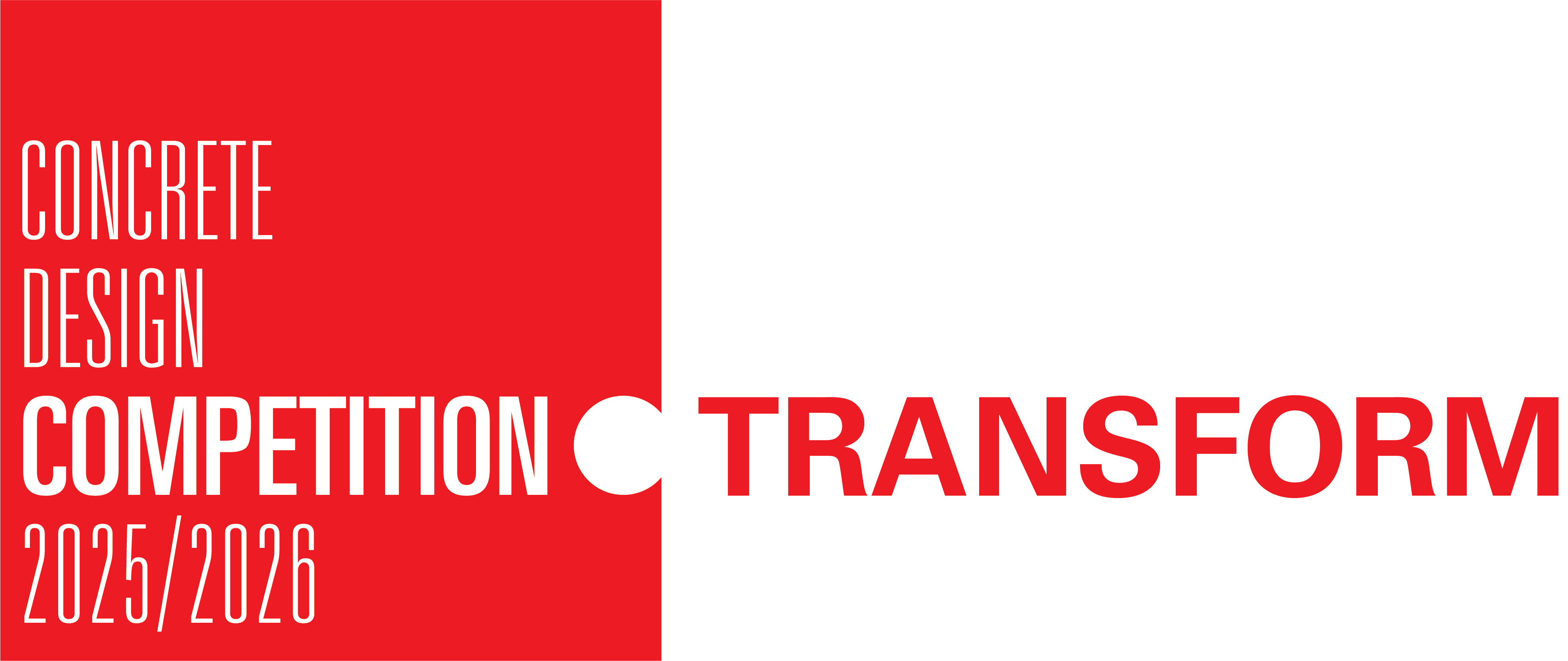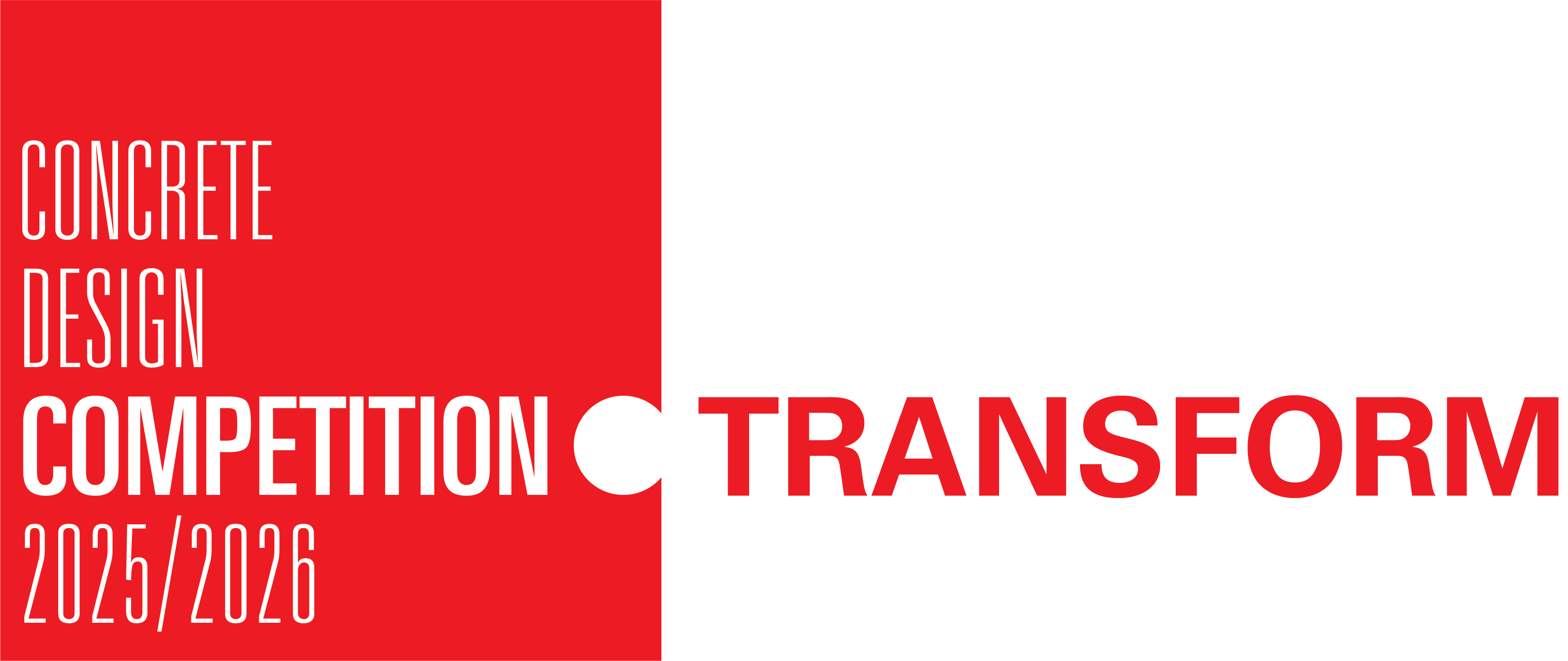ENERGY has become a powerful topic in the architectural debate on sustainable building. It is taking a prominent position next to reuse, CO2 emissions, reductions on waste materials and other environmental impacts. Current trends in addressing these issues tend to focus on imposing approaches, in which reducing, minimizing, restricting and preventing seem to be the buzz-words.
This competition seeks to investigate the inherent characteristics of one material, concrete, in relation to ENERGY. It asks to evaluate those properties of concrete that make it a relevant and versatile material for ‘energy-aware’ applications. It aims to fully pursue the potential of core properties like mass, volume, surface textures, mixtures and hybrids, in acting on current needs and ambitions.
The 5th Concrete Design Competition - ENERGY stands for a comprehensive strategy to optimize the relations between the built environment and its users. Production and consumption of energy can be dealt with intelligently when taking into account day and lifetime cycles. Storage and distribution needs to be managed with programmatic varieties in mind. Developing built structures that produce energy is part of a more inclusive approach as well.
ENERGY signifies a powerful presence in an architectural sense. How buildings activate and facilitate their users; how they project vitality to their surroundings in form and material – simply by how architecture is.
This competition aims to maximise the material’s potential in its combined technical, physical and architectural opportunities. Applied mass can be embraced to facilitate ‘formal’ and expressive desires that so far have suffered in richness through strategies of minimizing. Simultaneously mass can be deployed to offer capacity for harvesting and storing warmth and coolness. Required volumes and structures can extend in meaning and use beyond their original task of facilitating program. Surfaces and structures can both be visually enticing and can be optimized to capture, store and transport energy.
Students are asked to explore and exploit the potential of concrete’s properties with respect to any notion on ENERGY. These can range from issues of vitality, robustness, dynamic behavior and architectural presence to energy production, storage and consumption. Competition entries need to address technical and functional aspects as well as formal and programmatic ones – ideas need to be tested through design proposals to demonstrate their potential convincingly. They will be reviewed on the combination of inventiveness in addressing the competition’s theme and architectural implications.
This competition does not prescribe a specific location or program; participants can choose a context of their own that supports their fascinations and ambitions and that fits an acute presentation of their ideas and solutions. The design proposals may range from objects, furniture and architectural details to housing, landscape interventions, complex buildings, infrastructure and structural systems.
5TH CONCRETE DESIGN COMPETITION ON ENERGY
Kees Kaan on 'Escape from the Cavity Wall'
In conversation with Siebe Bakker
AA123 - A concrete organ at the shore
Netherlands (First Prize)
Marijn Abelman, Robert van Middendorp & Thierry van Til - ArtEZ Zwolle
AF111 - Concrete Cymatics
Germany (Joint Winner)
Joanna Burton & Pablo Humanes - FH Köln
Sadaf Mirzaei - Macromedia Hochschule für Medien und Kommunikation Köln
BM890 - Energy - from Greek, energeia - activity
Ireland (Joint First Prize)
James Boyd & Julian Manev - Queens University Belfast
CR777 - To Cast Light on Seaweed
Ireland (Joint First Prize)
Colin Dorgan & Ray Mc Greal - SAUL University of Limerick
CS000 - Chamcrete
Turkey (First Prize)
Semra Refkaeva Shukrieva & Coşku Çinkılıç - Istanbul Technical University
GN123 - Concrete Tornado
Netherlands (Honourable Mention)
Ruben Geutjens & Nick Noordam - Technical University Delft
HM148 - The Erratic, Stopping Point
Ireland (Third Prize)
Jennifer Kingston - SAUL University of Limerick
IB612 - MoistureSchool Practice
Netherlands (Honourable Mention)
Irene Boertien - Technical University Eindhoven
MD325 - Meander Drain
Netherlands (Second Prize)
Vera Konietschke & Mariet Sauerwein - Technical University Delft
OM023 - Chaning Perception
Netherlands (Third Prize)
Olaf Burlage & Muriz Djurdjevic - Technical University Delft
TY241 - Through Water to Produce Concrete
Turkey (Second Prize)
Aylin Yeğen & İbrahim Türkeri - Kocaeli University
COMPETITION JURORS
Belgium
Audrey Contesse, Bernard Kormoss,
Christophe van Gerrewey, Henk de Smet, Jean-Didier Bergilez,
Klaas de Rycke
Germany
Arno Brandlhuber, Bettina Kraus, Christiane Bohlmann, Tobias Wallisser, Volker Schmid
Ireland
Ciarán Ferrie, Douglas Carson, Guy Thompson,
Selma Harrington
Netherlands
Larens Jan ten Kate, Olv Klijn, Michiel Haas,
Rogier van Nalta, Tom Bosschaert
Turkey
Murat Arif Suyabatmaz, Alpaslan Ataman,
M. Burak Altinisik, Hasan Çalislar, Tulin Hadi
Vera Konietschke & Mariet Sauerwein in Concrete Design Competition on ENERGY
In conversation with Siebe Bakke
Olaf Burlage on Concrete Design Competition on ENERGY
In conversation with Siebe Bakker
Participants:
Aylin Yegen, Colin Dorgan, Coşku Çinkiliç, Ibrahim Türkeri, james Boyd, Jenny Kingston, Joanna Burton, Julian Manev, Mariet Sauerwein, Marijn Abelman, Michael Albertshofer,
Olaf Burlage, Pablo Humanes, Ray Mc Greal,
Robert van Middendorp, Semra Refkaeva Shukrieva,
Steffen Winkler, Thierry van Til & Vera Konietschke
Tutors:
Hans Köhne (Cement&BetonCentrum), Ifke Brunings & Patricia Hessing (Ateliers) & Siebe Bakker (bureaubakker)
Experts, critics and lecturers:
Arjan Habraken (SIDstudio), Caroline Kruit (dax),
Daan Roosegaarde (Studio Roosegaarde),
Gregor Zimmermann (G.tecz), Kasper Jørgensen (GXN),
Leo Dekker (Mebin), Mark van Halderen (ENCI)
& Steven Gelderman (NOE Betonvormgeving)
Support:
De Bonth van Hulten; Fer van Dommelen, Jorg Klomp,
Lamberto van Mook, Marcel de Gouw, Rick Boelen
& Toon van Mook
Cement&BetonCentrum; André Burger,
Anja van den Bogaart, Natasja Steenbergen
& Wim Kramer
ENCI; Hennie Kemper
Sodexo; Fanny Marcé, Henny van der Linden &
Willeke Segers & Ton Kwaytaal
Photography:
Bram Rutten for bureaubakker
KEY NOTE LECTURERS
Daan Roosegaarde, NL
artist & architect
Principal Studio Roosegaarde
Artist and architect Daan Roosegaarde (1979) explores the dawn of a new nature that is evolving from technological innovations by creating interactive landscapes that instinctively respond to sound and movement. Roosegaarde’s remarkable works of art function as a documentation of the dynamic relation between architecture, people, and technology.
His sculptures, such as Dune and Intimacy, are tactile high-tech environments in which viewer and space become one. This connection, established between ideology and technology, results in what Roosegaarde calls “techno-poetry”.
In 2009, Roosegaarde won the Dutch Design Award. He has been the focus of exhibitions at the Tate Modern, the National Museum in Tokyo, the Victoria and Albert Museum in London, and various public spaces in Rotterdam and Hong Kong.

Kasper Guldager Jørgensen, DK
architect
Head of GXN, associate partner 3XN
3XN’s Research department, GXN, is established in order to exploit the possibilities that arise when you apply the latest knowledge and technology. The idea is that the expertise and know-how from the department should be implemented in the work of the office. By using new materials and technologies, 3XN will develop a building culture that positively affects the world in which we live – architecturally and environmentally.
Digitalisation has given designers, engineers and architects new tools to work with. This has led to new design and production methods that can generate a new type of architecture. The natural sciences are also moving fast. Within the fields of biology, chemistry and physics it is today possible to design materials that meet specific needs.

CRITICS, EXPERTS & HOSTS
Hans Kohne, NL
General concrete expert & host
Market- and product development Cement&BetonCentrum,
host workshop - coordinator 5th Concrete Design Competition
Hans has been at the birth of the Concrete Design Competition initiative. He has appeared in various material-based workshops as consultant on all kind of concrete issues. This cycle the Netherlands operates as coordinating
country and as host for the workshop.
'It's always about connections. The meeting, the touch, there's where it happens.
This is true for people as well as for materials. It will always have my interest.'

Gregor Zimmerman, DE
Civil engineer
In 2007 Dr. Gregor Zimmerman, with his partner Thomas Teichmann, began G.tecz an interdisciplinary company composed of material specialists, structural engineers and laboratory experts working to optimize and develop structural and cement-bonded materials. Their latest research includes nano based particle packing algorithms, calculation of water film thicknesses, finite element methods and the use of SQL databases.
Gregor Zimmerman studied civil engineering in Karlsruhe, Germany,
and completed his Ph.D. at the University of Kassel on the topic of membrane concrete grid shells.

Arjen Habraken, NL
Structural engineer
After more than 10 years working as lead designer and project manager/director at Arup in Amsterdam and taking part in their leadership of the structural group, Arjan Habraken recently started his own firm called SIDstudio – representing Structural Innovative Design. With this firm he want to focus more on the design aspects of structure, always with a strong architectural added value and a high level of integration with other disciplines.
Arjan is fascinated by lightweight structures and their inseparable architectural and structural buildup - how Force, Form and Function come together. He teaches part-time lightweight structures at the faculty of Architecture, Building and Planning at the Eindhoven University of Technology.

Caroline Kruit, NL
Structural engineer, journalist, publisher
Caroline is creator, editor and publisher of dax. dax magazine was born at the kitchen table in The Hague: an initiative widely supported within the world of architecture, building and affiliated industries from its start.
Regularly dax also organizes dax_seminars for building marketeers and architects.

TUTORS
Ifke Brunings, NL
structural engineer / designer
principal ATELIERS
Ifke (1968) has appeared as tutor at both the 'Monolithic' and the 'Implicit Performance' master classes.
ATELIERS designs furniture, buildings, products and interiors. ATELIERS is innovative holding great respect for what already was. ATELIERS connects extremes: pure beauty and decadence, the subtile and the banal, old and new. ATELIERS is excitement. ATELIERS is humor. ATELIERS is international. ATELIERS is vintage Dutch. ATELIERS is on the border of the ordinary.

Patricia Hessing, NL
architect
principal ATELIERS
Patricia(1966) has extensive teaching experiences at TU Delft and the Academy of Architecture Amsterdam.
She worked as tutor on previous Concrete Design Master Classes as well.
ATELIERS designs furniture, buildings, products and interiors. ATELIERS is innovative holding great respect for what already was. ATELIERS connects extremes: pure beauty and decadence, the subtile and the banal, old and new. ATELIERS is excitement. ATELIERS is humor. ATELIERS is international. ATELIERS is vintage Dutch. ATELIERS is on the border of the ordinary.

Siebe Bakker, NL
architect / producer
Principal bureaubakker / international coordinator Concrete Design Competitions
Siebe(1964) has been a driving force behind the Concrete Design Competition since its start. He has operated as international coordinator and content provider for the competition series and its master classes.
bureaubakker produces cross-disciplinary knowledge exchanges between industries, educational institutes and design practices. We are convinced that exchange and creation of knowledge forms the key factor in understanding and developing one's own expertises. These exchanges are focused on pragmatic creative processes and are based on innovative design approaches, strategic scenario techniques, cross-cultural collaborations and decision-making methods. Firmly based on an architectural and didactical background we facilitate research and development programs ranging from brainstorm sessions to international competitions. Depending on the ambitions and expertise of our clients we offer project support starting from generating concepts and formats to full project management and coordination, marketing strategies, supervision and publications.


